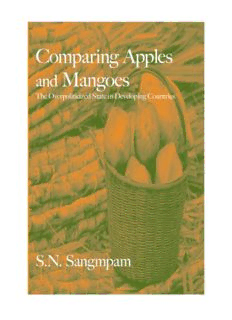
Comparing Apples and Mangoes: The Overpoliticized State in Developing Countries PDF
Preview Comparing Apples and Mangoes: The Overpoliticized State in Developing Countries
Comparing Apples Mangoes and The Overpoliticized State in Developing Countries S.N. Sangmpam Comparing Apples and Mangoes Comparing Apples and Mangoes The Overpoliticized State in Developing Countries S. N. Sangmpam S U N Y P TATE NIVERSITY OF EW ORK RESS Published by State University of New York Press, Albany © 2007 State University of New York All rights reserved Printed in the United States of America No part of this book may be used or reproduced in any manner whatsoever without written permission. No part of this book may be stored in a retrieval system or transmitted in any form or by any means including electronic, electrostatic, magnetic tape, mechanical, photocopying, recording, or otherwise without the prior permission in writing of the publisher. For information, contact State University of New York Press, Albany, NY www.sunypress.edu Production by Diane Ganeles Marketing by Anne M. Valentine Library of Congress Cataloging-in-Publication Data Sangmpam, S. N. Comparing apples and mangoes : the overpoliticized state in developing countries / S. N. Sangmpam. p. cm. Includes bibliographical references and index. ISBN-13: 978-0-7914-7113-5 (alk. paper) 1. Developing countries—Politics and government. 2. Developing countries— Economic conditions. 3. Developed countries—Economic conditions. 4. Developed countries—Politics and government. I. Title. JF60.S26 2007 320.9172'4—dc22 2006021970 10 9 8 7 6 5 4 3 2 1 Contents List of Illustrations vii Acknowledgments ix Introduction 1 Chapter 1. Comparing Apples and Mangoes 15 The Mischaracterization of Third World Experiences 15 Setting the Framework: Comparing Apples and Mangoes 23 Politics and Overpoliticization 30 Chapter 2. Sins of Universalism and Particularism 51 From the Behavioral Revolution to Modernization Theory 51 Democratization by Institutional Fiat 59 Universalism from the Left 72 Particularism and Anti–Third Worldism 76 Particularism in South America, Asia, and Africa 79 Conclusion 92 Chapter 3. Overpoliticization: Empirical and Historical Evidence 95 Overpoliticized Behaviors in Democratic Regimes 95 Overpoliticized Behaviors in Authoritarian Regimes 113 Overpoliticized Behaviors Common to Democratic and Authoritarian Regimes 129 Overpoliticized Behaviors in Western Countries 158 Conclusion: Differences and Similarities 166 Chapter 4. Overpoliticization: Quantitative Evidence 173 Data and Procedure 173 Results and Interpretation 175 Conclusion: Differences and Similarities 192 vi Contents Chapter 5. Understanding the Overpoliticized State 195 Political Institutions and the State as Effects of Politics 196 Compromise-Resistant Politics and the Overpoliticized State 201 The Liberal Democratic State as the Conceptual Contrast 215 Chapter 6. Basic Hypotheses About the Overpoliticized State 227 What Explains Liberal Compromise? 228 What Explains Overpoliticization? 238 Conclusion 256 Appendixes 259 Notes 269 Selected Bibliography 295 Index 317 Illustrations FIGURES 1.1 An Analogic Representation of Overpoliticization Versus Liberal Compromise 31 TABLES 1.1. Overpoliticized Behaviors in Electoralist Regimes 45 1.2. Overpoliticized Behaviors in Authoritarian Regimes 46 1.3. Overpoliticized Behaviors in both Electoralist and Authoritarian Regimes 47 3.1. Violent Opposition, 1948–96 153 3.2. Violent Opposition in South America, Asia, and Africa, 1948–66, 1967–89, 1990–96 (in percentages) 153 4.1. Presence of Overpoliticized Behaviors in South America, Asia, and Africa, 1948–66, 1967–89, 1990–96 (in percentages) 176 4.2. Presence of Overpoliticized Behaviors in Western Countries and Japan, 1948–66, 1967–89, 1990–96 (in percentages) 176 4.3. Presence of Overpoliticized Behaviors in Continental South America and the Caribbean, 1967–89, 1990–96 (in percentages) 178 4.4. Lack of Civil Liberties and Political Rights, 1967–89 (Means and Variations) 180 4.5. Frequency of Overpoliticized Behaviors, 1948–66, 1967–89, 1990–96 183 4.6. Pervasive Overpoliticized Behaviors, 1948–66, 1967–89, 1990–96 186 4.7. Frequency of Overpoliticized Behaviors and Their Variations 187 4.8. Frequency of Overpoliticized Behaviors: Analysis of Variance 188 4.9. Benferroni Test: Multiple Comparisons 189 vii Acknowledgments A while ago I published an essay critical of, among others, Guillermo O’Donnell’s theory of the state in Latin America. As one of the reviewers of the essay, O’Donnell, while in agreement with the substance of my argument, warned that to meet the kind of requirements I had set for a better understand- ing of the state in developing countries would take a lifelong project. This book is part of this lifelong project. Because in pursuing the argument I have had to clear first the undergrowth by taking a critical stand vis-à-vis other scholars’ works, my first words of acknowledgment are addressed to this group of scholars, including O’Donnell. Their works served as an intellectual stimulus for mine. And there is no better way of saying it than by paraphras- ing Charles Lindblom’s words to his critics in the preface to Inquiry and Change. Speaking of the price society pays for consensus and stability, he remarks that rather than know the price or discuss it, the critics wish to turn their attention and his [Lindblom’s] back to recounting the benefits them- selves. Paraphrasing him, I am aware of the contributions made by all the works discussed in this study. Rather than recount their contributions, I focus on those aspects of the works that, when subjected to criticism, are likely to advance the debate. Beyond this, my words of gratitude go to (the late) John Nagle and Mehrzad Boroujerdi of Syracuse University and Chris Anderson and Peter Katzenstein of Cornell University for their comments on selected parts of the earlier draft; to David Ost of Hobart College, who read the entire manuscript and forced me to rethink some of the issues; to Bob Mupier of Prairie View A&M University and Freedom King of Cornell University for long discussions on the quantitative portion of the study; to Joe Hotchkasst of Cornell University, whose expertise in fruits helped put my fruit analogy on firmer grounds; to Andrea Burke for designing the diagram for the anal- ogy; to my students in the graduate seminar on Comparative State-Society Relations at Syracuse University for their insight and skeptical questions; and to the Press’s anonymous reviewers for their perceptive comments. I also want to thank Michael Rinella, an acquisitions editor at SUNY Press, who maintained his interest in the book. Needless to say, I alone bear the respon- sibility for any error of conceptualization and interpretation. ix
Description: